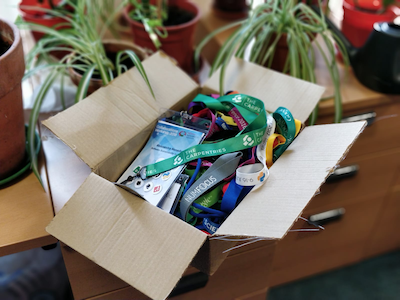Can we increase our impact by reducing it? Thoughts on environmental sustainability at CarpentryConnect Manchester 2019
Can we increase our impact by reducing it? Thoughts on environmental sustainability at CarpentryConnect Manchester 2019
Posted on 24 April 2019
Can we increase our impact by reducing it? Thoughts on environmental sustainability at CarpentryConnect Manchester 2019
 Photo by Niall Beard.
Photo by Niall Beard.By Aleksandra Nenadic, Training Lead, Software Sustainability Institute
While we will undeniably create a sizeable carbon footprint by travelling to and from Manchester this June for CarpentryConnect (#CCMcr19), I nevertheless wanted to explore the ways in which we can reduce our impact on the environment at the conference.
For the past couple of years, I have been trying to do little things here and there to reduce the negative impact I have on the natural environment. Among other things, I have been making an effort to take my reusable cup with me to meetings and events. Although, as pointed out to me by the Software Sustainability Institute's Director Neil Chue Hong once, the production of disposable cups is in fact more eco friendly as it takes 6 to 127 disposables (depending on the type) to match the continued use of one reusable alternative. To me, it is not just about the carbon footprint of producing a cup, it is the ever growing mountain of polystyrene cups that are not biodegradable and will never go away. This just means that we have to start using reusables sooner and more often.
Since I decided to undertake the organisation of #CCMcr19 on behalf of the Software Sustainability Institute, I’ve been toying with the idea of inviting people to bring their reusable cups to the conference. This was so brilliantly executed by Raniere Silva at another Institute’s event – the Collaborations Workshop 2019 – where we had a raffle using the tweets of photos of people with their reusable cups. This got me thinking of other ways we can improve our sustainability at #CCMcr19 and sparked a conversation with another member of my organising committee, Toby Hodges, joined by Raniere Silva.
Enter the idea of reusable lanyards and badges. The amount of money used for them is significant and we are all left with a bunch of stationary which we feel too sentimental to throw away but which is gathering dust nevertheless. Or we throw them away and feel guilty over it. Again, this idea is not new – people have been reusing their lanyards and badges in the past. But we want to invite everyone at the conference to do it – either to bring their own lanyard and A6 badge (or any other size they have) or to use one of the recycled ones provided by us. This quickly escalated into a box full of colourful lanyards on my desk (see the photo above) that colleagues have been kindly donating. We also came up with an idea for a raffle at the conference (credits to Raniere Silva): find a person with an exact same lanyard as you, take a picture together and tweet it with a hashtag #CCMcr19ReusableLanyards for a chance to win a small (reusable) prize.
Since then, we’ve come up with a few other ideas:
-
We have opened a Slack channel for the conference where attendees can try to find a person to share your taxi or accommodation.
-
If you can travel by public transport, local Manchester transport information is available online.
-
If you eat meat in your diet and have not registered for the conference yet, why not go vegetarian or vegan for the duration of the conference?
-
If you don’t need your lanyard and badge after the conference, we will have a box to collect them at the end and will reuse them at our future events.
-
We will try to reduce the amount of printed material.
-
In addition to reusable coffee/tea cups, why not bring your reusable water bottle too?
-
Some brilliant tips pointed out to me by another organising committee member Malvika Sharan.
-
Tweet other ideas using #CCMcr19ReduceCO2 – we'll gather them all and try to implement as many as we can now and in future events run by the Institute. We’ll also publish a blog post with the communities’ ideas to share them with everyone.
Let’s see if we can inspire other events to follow a similar practice and increase the impact we have on the wider community by trying to reduce the impact we have on the environment.

